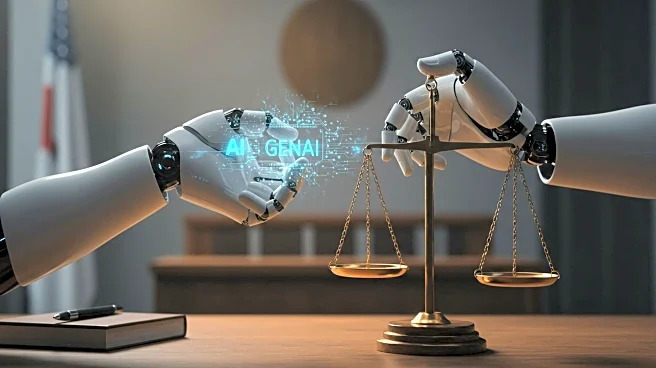What is the story about?
What's Happening?
Recent developments indicate that U.S. courts are increasingly integrating AI and GenAI technologies into eDiscovery processes. This shift is marked by a focus on transparency and defensibility, as demonstrated in cases like EEOC v. Tesla, which is among the first to approve GenAI for attorney responsiveness review. The courts are establishing practical frameworks for AI implementation, emphasizing the importance of disclosure requirements and meet-and-confer obligations. Validation methodologies and recall targets are being scrutinized to ensure they meet judicial standards. The integration of AI in legal workflows aims to enhance efficiency while maintaining rigorous standards of transparency.
Why It's Important?
The adoption of AI and GenAI in eDiscovery processes represents a significant shift in the legal industry, potentially transforming how legal professionals handle large volumes of data. This move could lead to increased efficiency and cost-effectiveness in legal proceedings, benefiting law firms and their clients. However, it also raises concerns about the 'black box' nature of AI technologies, necessitating clear protocols to ensure transparency and accountability. As courts set precedents for AI use, legal professionals must adapt to new standards, impacting training, technology investments, and client interactions.
What's Next?
As AI technologies become more prevalent in legal settings, stakeholders can expect further developments in court protocols and standards. Legal professionals may need to engage in ongoing education to stay abreast of evolving AI applications and judicial expectations. Additionally, there may be increased collaboration between technology providers and legal entities to refine AI tools for legal use. Future court cases will likely continue to shape the landscape of AI in eDiscovery, influencing how legal teams approach data management and case preparation.
Beyond the Headlines
The integration of AI in legal processes could have broader implications for privacy and data security. As AI systems handle sensitive information, ensuring robust security measures will be crucial to protect client data. Moreover, the ethical considerations of AI decision-making in legal contexts may prompt discussions about the role of human oversight and accountability in AI-driven processes.















